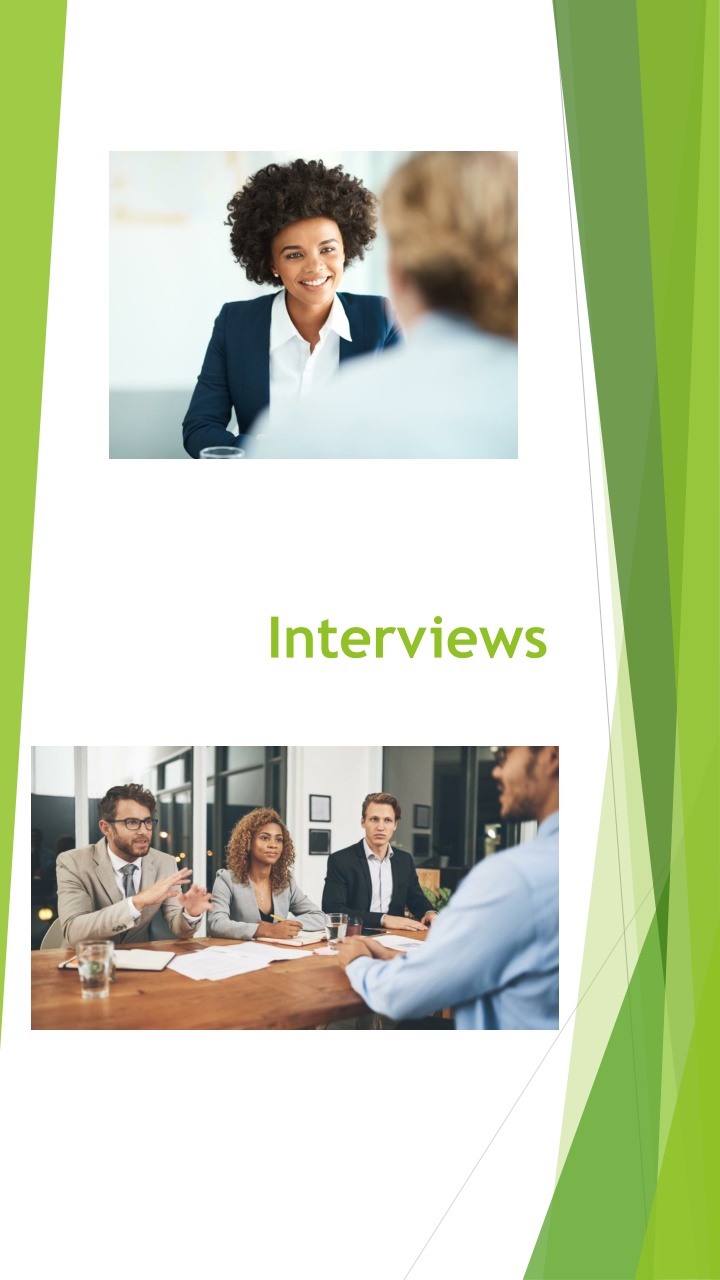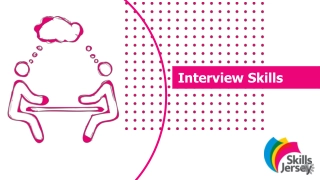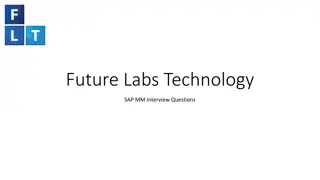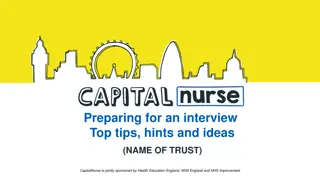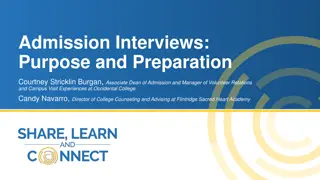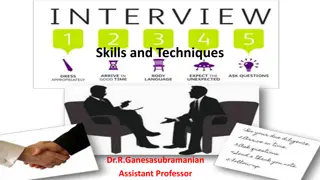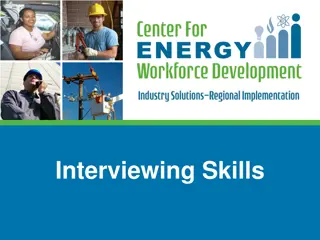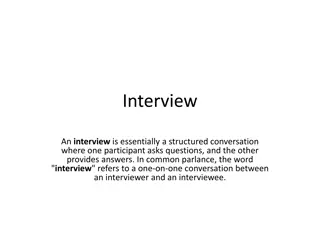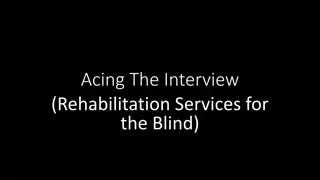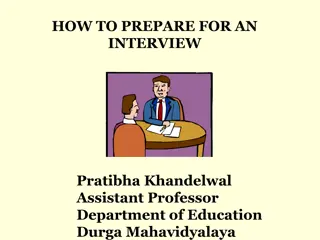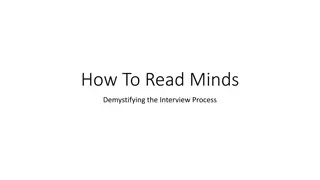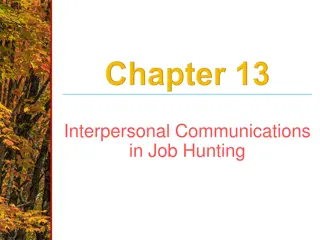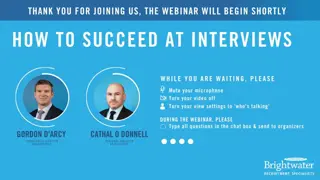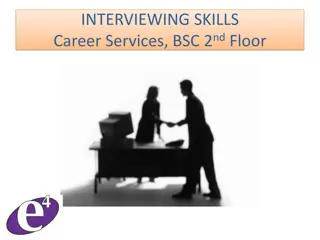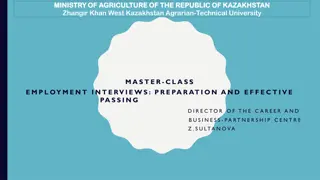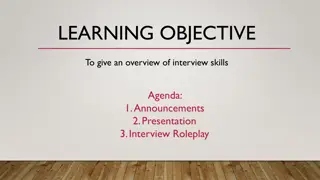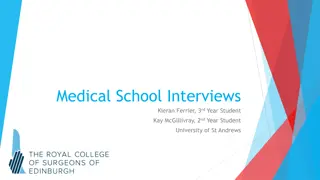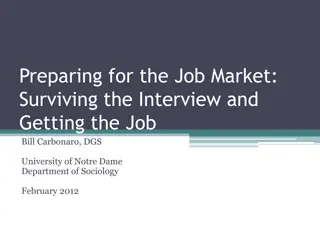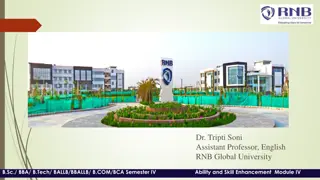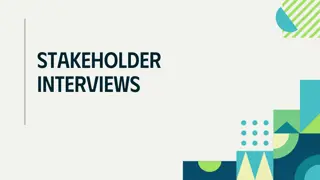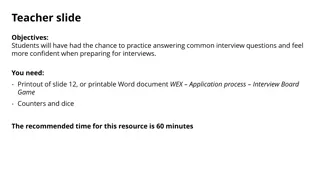Interview Preparation Guide: Research, Practice, and Excel in Your Interviews
Interviews can be nerve-wracking, but proper preparation can help you ease your nerves and excel. From researching the company to practicing mock interviews, planning your outfit, and mastering common interview questions using the STAR model, this guide provides valuable tips to ace your next interview. Take control of your interview by showcasing your skills, experiences, and enthusiasm effectively to leave a lasting impression on your potential employer.
Download Presentation

Please find below an Image/Link to download the presentation.
The content on the website is provided AS IS for your information and personal use only. It may not be sold, licensed, or shared on other websites without obtaining consent from the author.If you encounter any issues during the download, it is possible that the publisher has removed the file from their server.
You are allowed to download the files provided on this website for personal or commercial use, subject to the condition that they are used lawfully. All files are the property of their respective owners.
The content on the website is provided AS IS for your information and personal use only. It may not be sold, licensed, or shared on other websites without obtaining consent from the author.
E N D
Presentation Transcript
Interview Preparation Interviews can make many of us feel nervous but if you prepare for them, it should help to calm your nerves. Here are a few steps that you can take to prepare for an interview: RESEARCH- Visit the company website and read the information. PREPARE- Think about what your role will involve and plan some questions to ask the interviewer. OUTFIT- Make sure that it is clean and ironed the day before the interview. MOCK INTERVIEW- Practice with a family member or friend, or book an appointment with Wakefield College Careers Team. CV- Print off a copy to take to the interview with you. TRAVEL- Look at how you will get to your interview. If you have time, do a trial run. After the interview, allow the employer time to decide if you have been successful. If you haven t heard anything from them 1 week after your interview, it is worth sending them a polite, follow up email. This email can thank them for considering you and you can ask for some feedback about your interview. This will show the employer how keen you are and their feedback will help you with interviews in the future.
Interview Questions You should think about the interview questions that you might be asked. It is important to use examples to back your answers up. The STAR model will help you to answer questions well during your interview. Situation- set the scene e.g. I am studying BTEC Diploma at Level 3 in Business at Wakefield College and I have a lot of coursework to do for it . Task- describe the task that needed to be completed e.g. I had 3 college assignments that were all due to be handed in on the same day . Action- explain what you did e.g. As soon as I was given the assignments, I made a rota to help me to plan the time that I would spend completing them . Result- share the outcome e.g. The rota worked well and I handed in all 3 assignments on time and got a distinction in all . Remember, your interviewer will most likely have had an interview in the past and will understand how you are feeing. Take your time with your answers and speak clearly. If you feel unsure of what the interviewer is asking you, don t be afraid to ask them to repeat their question or explain it further. Smile and try not to let your nerves get the better of you
Examples of Interview Questions Tell us/me about yourself. Talk about your experiences with examples of what and how you have done them. Let the interviewer know how you like to spend your spare time. Share your skills and abilities; your personality, hobbies and interests and how you prefer to work. This question gives you the opportunity to cover most of the questions that you think the employer might ask you. You should do most of the talking to give you more control over the interview. What do you like to do in your spare time? Talk about your hobbies and interests. If you play in any team sports this is worth mentioning as it tells the employer that you can work with others. Why have you applied for work experience at this company? Use this opportunity to show the employer what you know about them from the research that you have carried out. Talk about what you would like to gain from the experience and explain how it will help you in the future. What skills can you bring? Highlight what your strengths are and how this will help the employer. An example may be that you can use various social media and could help them with this. How do you work as part of a team? This is a very common question as employers want to know how well you work with others. The key points that they want you to discuss is how you communicate with other people and the ways that you help others when you work as part of a team. Do you have any questions for us? You should always have a couple of questions ready to ask the employer at the end of your interview. This gives you the chance to give any information that you may have missed and shows your interest in the role.
